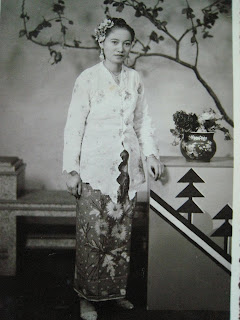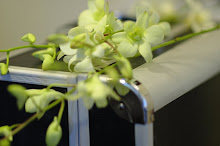During a recent trip to Singapore to visit my brother and sis in law over the Wesak long weekend, my brother passed a collection of DVDs to me of a series called The Little Nyonya. He said that I have to watch it, it will make me realize what I am and what I should be.
It is a local production by Mediacorp TV Singapore on the story of a Peranakan family. Since it is almost unheard of for my brother to actually sit through 34 episodes of chinese drama, I was curious to find out why.
The amount of research on the Baba and Nyonya culture that went into the making of the series was truly remarkable. After sitting through the first episode of the series, I could understand why my brother insisted I watch this. It reminded him so much of our upbringing at home, of our maternal Peranakan side. The daily lives depicted in the series were so real, so familiar. I could not help but feel a slight tightening of the chest, trying to stop the sudden onslaught of emotion.
My brother said, we take who we are so much for granted. We do not realize all the painstaking years Ah Mah and Mom spent trying to bring us up as good Peranakan children. Now, one might wonder, how does that differ from our peers?
I used to feel that I was treated unfairly at home. Why? Because as a child, I was not allowed this, and that. Especially Ah Mah, she would knock my head and tell me;
I must not walk with giant steps
I must not stamp my feet - we lived in a wooden house; when I am walking upstairs I must not make a single sound with my feet
I must not speak too loud
I must never yell
I must never be rude, always be polite and always address the elders correctly - Ee Por, Ah Kor, Ah Chim.... I truly did not understand what all the difference were
I must not ever sit with my legs apart, up on the chair nor crossed my legs on the floor. I must always sit with both legs to one side
I must close doors and not make a single sound. Slamming the door (either by purpose or by accident) will earn me a painful 'cubit' (painful pinch)
I must not hit the wok or any pots/pans with a spoon or any utensil and make a loud clanking noise. It is not ladylike
I must not chew with my mouth opened nor speak with food in my mouth
I must not ever talk back to my elders nor ever raise my voice to them. My parents are considered always right no matter what happens
So I went to school and I saw how other children could run and play and scream their hearts out. Mom and Ah Mah would tell me, it was not lady-like. The good girl in me then would not retaliate or disagree. But the rebel in me looked at things differently and I favored my brother's toys and playing with his friends instead. That was the only way I could 'do things the way I like'.
At last, we grew up, Ah Mah and Mom , did not need to constantly nag at us no more. All the years of rules stuck in my head. It now aggravates me when a door is slammed, or someone chews noisily or I hear a utensil being hit loudly against the wok to remove food that is stuck to its surface. It absolutely isn't acceptable at all when someone noisily moves things around in the kitchen - plates, containers.....
My brother, on the other hand, is probably the most loving of all sons. I am so proud of how he would, without further thought, rush to the family's aid in all situations. Like myself, he is also extremely close to our parents and Ah Mah.
I truly am enjoying watching the Nyonya series. It brings back so many memories, good and bad. It makes me feel a tad guilty for all the good Nyonya recipes that mom had taught me, but I rarely replicate. Sitting next to Hubby watching the show, and him seeing my culture for what it truly is for the first time (he's not Peranakan), I realize just how much I take it for granted.
Well, I think I am going to try my best, again, to be the good Nyonya daughter and grand-daughter that mom and Ah Mah had wanted me to be.
Chin Up!
16 years ago







1 comment:
Wow.. such a nice heritage.
Post a Comment